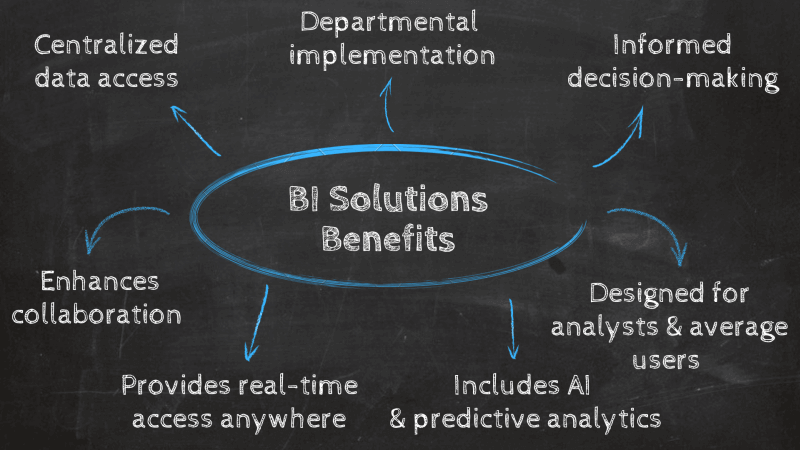Exploring Different Types of Business Intelligence Solutions
In the rapidly evolving world of business, making informed decisions has never been more crucial. This is where Business Intelligence Solutions step in to help companies turn raw data into actionable insights. Whether you’re a business owner, a manager, or just someone curious about how businesses operate behind the scenes, this article is your guide to understanding the various types of business intelligence solutions.

1. Introduction
In today’s fast-paced business landscape, informed decision-making plays a pivotal role in achieving success. This is where Business Intelligence (BI) solutions come into play. In this article, we will dive deep into the realm of business intelligence and explore the various types of BI solutions available to enterprises.
2. Understanding Business Intelligence Solutions
Business Intelligence solutions encompass a range of technologies, processes, and tools that empower organizations to collect, analyze, and present data in a meaningful way. These solutions enable businesses to gain valuable insights, make informed decisions, and identify trends that can shape their strategies.
3. Key Components of Business Intelligence Solutions
A comprehensive BI solution comprises several essential components:
- Data Sources: BI solutions gather data from various sources, including internal databases, external APIs, and cloud platforms.
- Data Warehousing: Data is stored in a central repository known as a data warehouse, ensuring consistency and accessibility.
- Data Integration: BI tools integrate data from disparate sources, transforming raw data into a consistent format for analysis.
- Data Analysis: Advanced analytics tools allow businesses to explore data, uncover patterns, and generate actionable insights.
- Data Visualization: Presenting data in the form of interactive dashboards, charts, and graphs enhances understanding and aids in decision-making.
4. Types of Business Intelligence Solutions
4.1. Traditional BI Tools
Traditional BI tools are foundational platforms that enable users to create static reports and predefined queries. These tools are suitable for structured data analysis and are commonly used by business analysts and managers.
4.2. Self-Service BI Platforms
Self-service BI platforms empower non-technical users to perform their analyses without relying on IT teams. These solutions offer intuitive interfaces and drag-and-drop functionalities for creating custom reports and visualizations.
4.3. Operational BI Systems
Operational BI systems focus on real-time data analysis, allowing businesses to monitor key performance indicators and make immediate decisions. These systems are crucial for industries that require swift actions, such as retail and finance.
4.4. Mobile BI Applications
Mobile BI applications extend the reach of BI solutions to mobile devices, enabling users to access insights on the go. These apps provide convenience and flexibility, ensuring decision-makers are always connected to their data.
5. Benefits of Implementing Business Intelligence Solutions

Implementing BI solutions offers several advantages:
- Informed Decision-Making: BI solutions provide timely and accurate insights, enabling well-informed decisions.
- Competitive Advantage: Organizations gain a competitive edge by identifying market trends and customer preferences.
- Efficient Operations: BI solutions optimize processes, leading to improved operational efficiency.
- Data-Driven Culture: BI fosters a culture where decisions are based on data rather than intuition.
6. Factors to Consider When Choosing a Business Intelligence Solution
When selecting a BI solution, consider:
- Scalability: Ensure the solution can handle growing data volumes.
- Ease of Use: User-friendly interfaces are essential, especially for self-service BI platforms.
- Integration: The solution should seamlessly integrate with existing systems.
- Customization: Choose a solution that can be tailored to your business’s specific needs.
7. FAQs About Business Intelligence Solutions

7.1. What is the purpose of business intelligence solutions?
BI solutions help organizations turn raw data into actionable insights, aiding in strategic decision-making.
7.2. How do business intelligence solutions enhance decision-making?
By analyzing data from various sources, BI solutions provide a holistic view of the business, enabling informed decisions.
7.3. What industries benefit the most from BI solutions?
Industries such as retail, finance, healthcare, and manufacturing benefit significantly from BI solutions.
7.4. Can business intelligence solutions be customized for specific needs?
Yes, many BI solutions offer customization options to align with the unique requirements of different businesses.
7.5. What challenges can arise during BI solution implementation?
Common challenges include data integration issues, lack of user adoption, and selecting the right KPIs for measurement.
8. Conclusion
In the era of data-driven decision-making, Business Intelligence solutions have emerged as a crucial tool for organizations seeking a competitive edge. By harnessing the power of data analysis and visualization, businesses can uncover insights that drive growth, streamline operations, and navigate complexities with confidence. Whether it’s traditional BI tools, self-service platforms, operational systems, or mobile applications, choosing the right type of BI solution depends on the unique needs and objectives of the organization. Embracing BI solutions is not just a technological advancement, but a strategic imperative in today’s dynamic business landscape.
So there you have it, a comprehensive journey through the diverse realm of Business Intelligence Solutions. Remember, while the tools may differ, the goal remains the same: to transform data into wisdom that guides the path to success.







